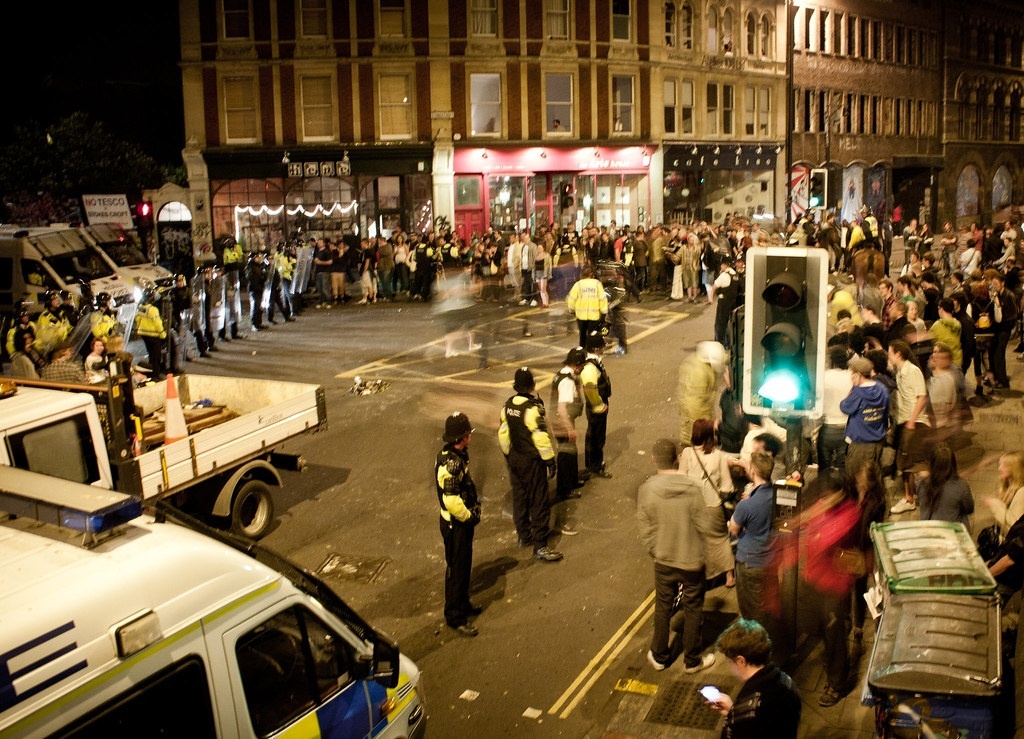“Kill the Bill” demonstrations in Bristol against the Police Crime, Sentencing, and Courts Bill turned violent on the night of 21 March, with more violent clashes and scuffles occurring in the following week. Riot police were deployed after officers were injured and police vehicles torched. The Home Secretary Priti Patel condemned the protests as “thuggery and disorder” while Prime Minister Boris Johnson called them “disgraceful”.
There are concerns that the violence will alienate the wider public from the cause of opposing the controversial legislation, which plans to give police increased powers to shut down protests. This alienation is likely due to the public’s lack of understanding of the threats posed by the Bill to our democracy, and the framing of the protests by the government.
Why is stopping the Bill so important, and will violent protests distract the public from this goal?
The proposed legislation threatens to grant police the powers to fully incapacitate protests as a means of public expression and opposition. The Bill itself is suspiciously broad and complicated, dubbed by MPs as a “trojan horse”. The 300-page document was published in just one week, perhaps to hinder efforts to scrutinise it.
Clauses 54-60 in part 3 effectively criminalises disruptive protests. The definition of disruptive is vague and applies even to one-person protests. Additionally, clauses 54-56 and 60 allow police to impose penalties such as high fines for conditions protesters “ought to have known” about. The Shadow Home Secretary Nick Thomas-Symonds said that this would “have the effect of criminalising people who unwittingly breach conditions”. This would be exacerbated by the length and complexity of the Bill.
The Bill also introduces a new statutory offence of “intentionally or recklessly causing public nuisance”. Committing or causing the risk of serious annoyance or inconvenience, and damaging statues or memorials carries the risk of up to ten years imprisonment. This is twice the maximum sentence for assault causing bodily harm and follows less than a year after the toppling of the Edward Colston statue during the Black Lives Matter protests in Bristol.
Clauses 57 and 58 also propose widening the “controlled area” around Parliament in which protests can take place. This effectively acts as a measure for those in power to be able to go about their business in the heart of the country’s democracy without having to hear or see the public’s opposition to their actions.
The implications of the Bill’s passing would be catastrophic for the right to protest in this country. Disruption and noise are an inherent part of many protests, as these factors aid in spreading the message of the protest and increasing the likelihood of a response from their target. The Bill promises to strip the ability of future protesters to make themselves seen, heard, and taken seriously – a violation of our democracy in the name of law and order.
The timing of the Bill also raises concern as it follows police frustrations in controlling the Extinction Rebellion and Black Lives Matter protest movements. The prospect that police may have more power to supress protests and gatherings of any sort which may be viewed unfavourably by the government for whatever reason is concerning.
The language used by the government is dangerously telling of their agenda to turn the public against the protesters. Usage of words such as “mob” and “thugs” by Johnson and Patel respectively to describe the protestors is intentionally demonising. This language arguably does more damage to the “Kill the Bill” movement than the acts of violence themselves, as it’s sure to be repeated into a mantra of justification for the legislation.
While the public may feel uneasy when confronted with images of burning police cars, it’s imperative to remember that without the freedom to protest, violent clashes will become more frequent expressions of public opposition, as peaceful demonstrations will have become futile.
Citizens in a democracy should never have to resort to violence in response to police actions or to express their views. However, it is important for the public to see past these clashes and look at the real issue at hand; a significant threat to our democratic and human right to assemble and make our voices heard.
Rayan Striebel
Image source: Flickr

